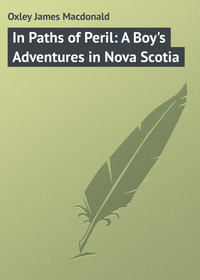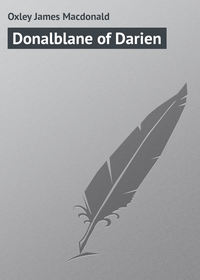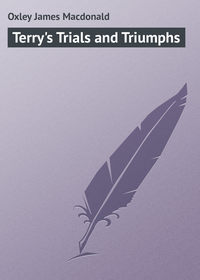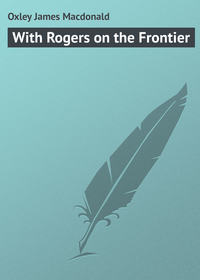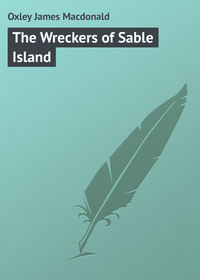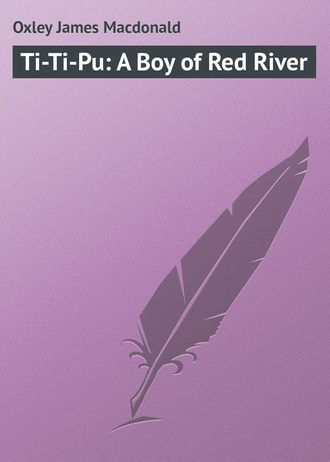 полная версия
полная версияTi-Ti-Pu: A Boy of Red River
A veteran hunter, nick-named Buffalo Carter, took entire charge of the hunt, and under his short, sharp commands the party was divided up, and sent off in different directions.
There were six in the party to which Mr. Macrae and Hector were assigned, and their captain – so to speak – was a shrewd, good-humoured half-breed, Narcisse by name, who had killed many score of buffalo in the course of his career. He had taken a liking to Hector, and he greatly admired Dour and Dandy, who, having vented their superfluous spirits, were now trotting quietly along beside Hector's pony, and he said to him in a sort of aside: 'You keep close to me, eh! mon petit ami. Kill big buffalo for sure, eh!'
Hector responded with a grateful smile. 'I will that if I can, but your fine horse will likely run away from my pony.'
'Non-non – that's all right,' laughed Narcisse, pleased at the compliment to his steed. 'You keep so near me as possible.'
The different groups of riders being about a quarter of a mile apart, the whole party covered a pretty wide stretch of prairie, as they steered due west at a leisurely lope.
The leader's plan of campaign was that, on a herd of buffalo being sighted, every effort should be made to surround it without stampeding it, and to this end instructions had been given to the captains of each band that not a shot should be fired until the signal was given by Carter himself.
On they loped over the billowy prairie, the tensity of eagerness growing with each mile covered. Suddenly, Carter, who was a little in advance of all the others, pulled up on the hither side of a swale, and gave the signal agreed upon for a general halt. It passed from band to band almost instantaneously and the hunters became as motionless as statues.
Carter, slipping from his horse, went forward cautiously on foot some little distance, and then, dropping on all fours, peered over the top of a big swale beyond which, perhaps, was the big game they sought.
'He see 'em! Buffalo near now!' exclaimed Narcisse to Hector, as he tightened rein and grasped his gun more firmly. 'You be ready, eh?' Hector was too excited to do more than nod assent, as he kept his eyes following every movement of Carter.
The latter, evidently satisfied with his scrutiny, made haste back to his horse, and, having remounted, by making a sort of semaphore of himself, waving his arms in rapid fashion, signalled to the captains of each band.
They caught his meaning, and the next instant, all were in motion closing in toward their leader. When they were near enough he signalled for them to spread out in a single line, then, waving his gun above his head as a final signal for them to do likewise, he dashed forward at the full speed of his swift steed.
As they swept over the swale, the buffalo came in sight – a fine herd, numbering several hundred, grazing on the rich grass in utter unconsciousness of the human cyclone rushing upon them.
The wind blew from them towards the hunters, thus giving the latter, whose ponies' hoofs made scarcely any sound upon the thick turf, the opportunity to get quite close ere an old bull threw up his head, caught sight of the charging cavalcade, and instantly gave vent to a thundering bellow of warning, that caused the whole herd to cease grazing and huddle together nervously.
Only for a moment did they thus hesitate. Then, moving as one huge black mass, they were off in full flight, with the hunters not a hundred yards behind.
Hector was amazed that such heavy, clumsy-looking creatures could get up such speed, and his excitement rose to its highest pitch as, urging his pony on by voice and heel, he strove to reach the rear of the panic-stricken herd.
Dour and Dandy, in no less a state of excitement, were already snapping at the heels of the buffalo, and enjoying themselves immensely.
Little by little Hector's clever pony, to which, by the way, he had given the appropriate name of Joseph, because his coat was of many colours, caught up to the herd, until, at last, with an extra spurt, he charged right into it, and Hector, not altogether to his comfort, found himself wedged in between two great shaggy animals, whose bloodshot eyes made them look very fierce, even if they were fleeing for their lives.
He did his best to check the speed of his pony, pulling upon the reins with all his might. But Joseph had got the bit in his teeth, and being in a regular frenzy of excitement, all Hector's efforts were fruitless. Not only so, but as the tremendous pace began to tell upon the buffalo, and their speed slackened, Joseph, who showed no signs of tiring, made his way deeper into the herd, until presently Hector was completely surrounded by the huge animals.
His situation was one of great peril, for, although the buffalo were too intent upon flight to pay him any attention, yet if by chance his pony were to stumble or put his foot in a gopher hole, bringing down himself and his rider, they would both infallibly be trampled out of all semblance of life under the hoofs of the mighty creatures.
But not for a moment did the boy lose his wits. Holding hard to the saddle he watched keenly for his chance of deliverance.
CHAPTER X
Lost on the Prairie
Not until he had become embedded as it were in the panic-stricken mass of buffalo did Mr. Macrae observe his son's peril.
At almost the same moment Narcisse caught sight of the boy, and, with a characteristic exclamation of horror, at once drove his horse into the herd, that he might, if possible, get to Hector's side.
'Take care! Take care!' he shouted with all his might, not recking that his voice was utterly lost in the thunder of the countless hoofs. 'Keep hold, eh!'
Mr. Macrae followed his example, and the two men plunged into the mob of terrified monsters, steering as best they could for the imperilled boy.
Meanwhile, Hector, who had kept both his head and his seat wonderfully, not forgetting the purpose of the whole affair, pointed his gun behind the shoulder of a fine fat buffalo and fired.
The muzzle of the gun was so close to the buffalo that the discharge burned the animal's hide, and the recoil almost knocked Hector out of his saddle.
But the bullet found its way to the great creature's heart, and, a moment later, down it went, to the delight of the young huntsman. The loud report was not without effect upon the buffalo that hemmed in Hector. They swerved off to right and left, giving him more room and thereby enabling Narcisse and his father to reach his side.
'Ah, laddie!' cried his father. 'I was in great fear for ye. Ye should na have gone into such danger. Be carefu' now, for ye're not yet out of harm's way.'
Hector nodded gaily in reply. He was so exultant over his success that he could think of nothing else for the moment.
As neither Narcisse nor Mr. Macrae had yet bagged their buffalo, they left Hector to stay beside his prize while they went on after the fleeing herd, upon whom the tremendous pace was beginning to tell.
The reports of the guns followed fast upon each other, as the different members of the hunting party, choosing a fine fat cow, or a prime young bull, brought down their victim with unerring aim.
At last the pursuit of the herd ended, and the hunters returned to take stock of results. These were certainly satisfactory: nearly a score of buffalo, all in the best of condition, had been secured, and a supply of food that would keep the whole settlement for many weeks was ensured.
Very proud and content was Buffalo Carter, and all the other members of the party, particularly Hector, whose buffalo was as fine a specimen as any of the others.
'Eh, but it was a warm, stirrin' experience,' remarked Mr. Macrae, with emphasis. 'I never expected to see the like of it. 'Tis a wonderful country, this, and there's a powerful lot to be learned. But I'm right glad I've come, laddie,' he went on, laying his hand fondly upon Hector's shoulder, 'and with the favour of God we shall yet do better here than e'er we could in the land we left.'
This was a good deal for him to say, but the excitement of the hunt had for the time swept away his reserve, and he was in almost as high spirits as Hector.
So soon as they had rested a little, the buffalo hunters set to work to skin the buffalo, and to cut the rich meat into long strips, which, after being dried in the sun, were then minced as small as possible, and so made into 'pemmican,' which was then packed away for use in the winter.
Of course, there was great feasting meanwhile, and the special tit-bits, such as the tongues and the humps, were cooked and eaten with the keenest relish.
Dour and Dandy were so well supplied with bits of juicy steak, or well-covered bones, that they were in danger of overfeeding, and Mr. Macrae had to limit their allowance.
It took several days to prepare the pemmican, and then, laden with it and with the buffalo-skins which would at leisure be made into the warmest of robes, the whole party moved slowly back to Pembina.
'Eh! but I'm glad I killed one myself,' said Hector to his father as they rode along together, 'for now I'll have a buffalo robe of my own, and that will be fine when the winter comes, won't it, father?'
So indeed it proved. There was many a night during the long cold winter at Pembina, when Hector, lying snug and warm under his buffalo-robe, had reason to be thankful for the success of his shot.
The reception of the hunting-party at Pembina was a royal one, and the feasting that followed was shared in by all. Then the remainder of the meat was stored away for the winter.
As already mentioned, Mr. Macrae had taken more pains and spent somewhat more money upon the hut that sheltered his family, and now, having got everything fixed to his satisfaction, with that fore-thought which was one of his distinguishing traits, he resolved to secure a supply of firewood for the winter.
A fine 'bunch of timber,' as it was called locally, stood not more than a mile away, and, hiring a horse and cart from one of the residents, Mr. Macrae, accompanied by his whole family – for it was beautiful weather, being the so-called Indian summer – began his attack upon the trees.
'I'll cut them doon, laddie,' he said to Hector, 'and ye'll chop off the branches, and so we'll just divide the wark between us.'
This arrangement suited Hector, and he did his part faithfully, lopping off the branches so that the trunk itself could be cut up into suitable lengths.
None of the trees were large. The country is not favourable to forest giants, and the wood was fairly soft, so that Hector's task was by no means beyond his powers.
The work went on steadily from day to day, and Mrs. Macrae viewed with the approval and satisfaction of a good housewife the growing pile of fuel that would be right at hand through the long winter.
'Ye always were a good provider, Andrew,' she said, giving her stalwart husband a look of ineffable love and pride. 'Nane o' yer charge will ever want while ye're aboot.'
From under his shaggy brows, Andrew Macrae returned the look of love and pride; for to him there was no woman so bonnie or so wise as his gude wife, but he pretended to make light of the compliment, saying he was but doing his duty.
The wood-pile at the hut had grown big enough, and they were making their last trip to the timber. Mrs. Macrae had not accompanied them, but little Ailie would not be left at home. She enjoyed too much the ride out on the empty cart, and then back again, perched triumphantly on top of the load, to lose the last chance for it. So father had to yield to her pretty pleadings, although he would have preferred her remaining with her mother.
The father and son worked very hard that day, and during the afternoon got so engrossed in the completion of their task, that they quite forgot the little girl.
Then, left to her own resources, Ailie, as sturdy a child for her years as ever stepped, wandered off over the prairie in the opposite direction to home, her little head filled with some foolish notion of getting nearer to the sunset.
On and on she went, forgetful of everything but the beauty of the western sky, which had so fascinated her, and it was because her blue eyes were intent upon this, and not upon what was under her feet, that she did not notice the coulee, or break in the prairie, into which she fell with a sharp cry of fright.
Happily it was soft earth at the bottom of the coulee, and Ailie was not injured in the least by her fall. But she was terrified beyond measure at her situation, and screamed for her father and brother with the full strength of her lungs.
But, lying as she was at the bottom of the coulee, a dozen feet or more below the surface of the prairie, her most vigorous efforts could not have been heard many yards away.
There the poor little lonely frightened girl wept and wailed and cried out for her father and Hector, until at last, in sheer exhaustion, she lapsed into a sort of stupor and knew no more.
CHAPTER XI
The Losing and Finding of Ailie
It was not until they had completed the day's task and the wood was all ready to be loaded into the cart, that Mr. Macrae missed Ailie.
Not seeing her about, he called out:
'Ailie, Ailie, my bairnie, where are you? Come ye here noo!'
Then, getting no response, he began to call louder and louder, and to go this way and that among the trees, looking anxiously for the golden-haired lassie, while Hector ran out on the prairie calling with all his might:
'Ailie! Ailie! come here.' Still no answer, and as the sun had set and it was already beginning to grow dusk, the anxiety of father and brother became intense.
Little Ailie was lost – lost on the prairie – and in a short time night would be upon them. Oh, what was to be done?
After the first hurried rushing hither and thither without avail, Mr. Macrae, realizing that it would be necessary to carry on the search on a larger scale, called Hector to him and said:
'We must have help. I'll go and get our friends. Ye bide here. Maybe Ailie will come back of herself.'
So saying, Mr. Macrae set off on foot across the prairie at a swift pace, far faster than could have been made by the heavily-loaded cart.
Thus left alone, Hector, in spite of himself, began to feel nervous. Snow, the first of the year, began falling softly and silently.
For some time Hector sat waiting, then the happy thought came to him to set the dogs on Ailie's trail. He took from his pocket a ribbon the child had dropped the day before, and showing it to the clever creatures, told them to 'find Ailie.' They seemed to understand at once what was expected of them, and set out on the vanishing, whitening trail, Hector keeping up with them as best he might.
Soon after this, Mr. Macrae and his party arrived, each man bearing a lantern or torch. They were greatly dismayed to find Hector also missing, and doubly hastened their preparations for the search. Under Mr. Macrae's directions, the party, leaving their horses tied to the trees, until they had first made search on foot, spread out in a long line, ten yards or so separating each man from his neighbour, and proceeded to make a thorough search of the prairie.
It was a weird night, and one such as never before had been seen there – the long line of lights bobbing about as the searchers moved through the darkness.
Meanwhile, Hector's search was being diligently made. Dour and Dandy hesitated once or twice as if puzzled, but in a moment trotted on again, and before very long they led Hector to the coulee. The excited boy fell rather than climbed down, and made straight for a sort of pocket in the bank where he could hear the dogs sniffing.
And there lay Ailie! Curled up like a kitten, and so motionless that, for a moment, Hector's heart stood still with fear. Then a quick move forward in the dim light, and his hand was among the clustered curls, and touching the warm, soft neck.
Ailie was alive! hurt, perhaps, but alive, and in the greatness of his joy the boy sent forth a shout that caused Dour and Dandy above to break forth into an 'exposition of barking' that attracted the attention of several of the searchers, making them wonder if the wise dogs might not have discovered something.
Hector picked up Ailie with the utmost tenderness. The child, aroused from her stupor, gave a little cry of fear, then threw her arms about her brother's neck, and burst into tears.
He hugged, and patted, and soothed her with loving words. 'And are ye no hurt anywhere?' he asked her, half in wonder, half in joy. 'Just to think of it. Oh, but the good God took wonderfu' care of you. Now just you bide there a minute, and I'll try to let them know I found ye.'
Ailie, puzzled but obedient, stood as she was directed, and Hector began to shout with all the vigour of his healthy young lungs. 'Hi there! Come here! I've found her! She's not hurt.'
The clear strong voice rose out of the coulee, and was first heard by those who had noticed the eager barking of Dour and Dandy. 'Ah! ha!' exclaimed one of them, Black Rory Macdonald, his shaggy face lighting up eagerly. 'Come awa', there,' – and off he went as fast as his mighty legs could carry him. He had no trouble in locating the dogs, and holding his lantern over the edge of the little hollow, he at once caught sight of Hector and Ailie.
'The gude Lord be praised!' he cried fervently. 'The bairnie's found, and there's nae hurt upon her.'
His joyous shouts rapidly brought the other searchers, Mr. Macrae being among the first to reach the spot. Without loss of time, the boy and girl were lifted out of the coulee, to be overwhelmed with demonstrations of delight and affection from men who ordinarily kept their feelings very strictly under control.
'And noo awa' tae yer mither – yer poor distracted mither,' broke in Mr. Macrae, gathering up Ailie and starting towards the place where the horses were tethered. With long impatient steps he swept over the ground, and, taking the first horse he came to, put Ailie upon the saddle before him, and galloped off for the encampment, where, with brimming eyes and trembling lips, he placed the child in the mother's arms, saying softly: 'Praise God, Mary, oor bairnie's given back to us.'
The winter came soon after this, and it was well for the Highland folk that they had at home been inured to the cold, for Jack Frost certainly did not spare them at Pembina.
The clear, dry atmosphere misled them at first. They would not realize how cold it really was, until nose or cheeks were nipped. And more than one of them had a narrow escape from being frozen to death.
Yet, upon the whole, the winter passed quite comfortably, albeit the question of food sometimes became a pressing one, when the hunters had been unsuccessful for a time.
One day, Narcisse, who took a lively interest in Hector, rushed to tell him that a great moose had been seen in the woods to the north, and that he was going out next day to hunt for him. He invited Hector to go with him.
Of course, the boy jumped at the invitation, and, his father not objecting, for he had considerable confidence in Narcisse, arrangements for the enterprise were made at once.
CHAPTER XII
The Moose Hunt
Mr. Macrae allowed Hector to take Dour and Dandy, and, as Narcisse had two good dogs of his own, they were well provided. The only other member of the party was Narcisse's half-brother, Baptiste, not equal to him in intelligence and experience, but a strong and good-natured fellow, who would take his share of work or danger.
They took a horse apiece, not to ride, for of course they travelled on snowshoes, but to carry their blankets, buffalo-robes, cooking gear, etc.
Hector was a very happy boy as he set forth on a superb winter morning clad in the warmest of clothing, and striding along upon his snow-shoes, in the use of which he had become quite expert.
His mother watched with eyes in which there was anxiety as well as admiration and love, but all she said was: 'Be verra carefu', laddie, and do whatever Narcisse bids you.'
They steered north-east from Pembina and travelled all day without interruption, except for the necessary mid-day meal.
The country now appeared to change somewhat. The deep woods had given place to rolling prairie, broken at the sky-line by low poplar bluffs. By nightfall they had reached the frozen marshy borders of the Roseau River. East from its waters there stretched hundreds of miles of spruce forest, home of the moose, caribou, and the great timber wolf. A rough camp was quickly made, and in the morning the hunters pursued their way again through the deep evergreens. In a short time more they would have reached the hunting-ground, when an accident occurred, that almost caused them to turn back empty-handed.
Narcisse, on his snow-shoes, in stepping over a half-burned log, fell forward, wrenching his knee so badly that on rising he could scarcely walk. All thought of the hunt had now to be given up, but as they were sadly retracing their steps, they espied the smoke of a tepee at the end of a small clearing.
A few minutes later, and to their joy they were in the broad tepee of their former friend, Wikonaie, who was himself, at that moment, preparing to start on a hunt.
Failing Narcisse, nothing would have suited Hector better than to have Wikonaie accompany them. Narcisse was left in Wikonaie's tepee in charge of the young Indians, and the horses were also left at the camp, as well as Narcisse's two dogs, who answered ill to orders from any one except their master. Then the party eagerly set-out.
The hours were passing without any sign of game, when Wikonaie gave a cry of joy. 'See!' he cried, 'you know what that means? Eh, I will show you a great moose soon.'
Their eyes followed the direction of his finger, and there, plainly printed in the snow, which was softer here, was the great footprint which, from its size, could be no other than that of the quarry they sought. They exchanged exclamations of surprise and delight, and then Wikonaie, bidding them tighten their belts, for there would be no dinner that day, gave out his plan of campaign.
The moose was ahead of him, perhaps only a mile or two; they must push forward with utmost speed and at the same time utmost caution. For this purpose, Wikonaie would lead the way, Baptiste follow, and Hector bring up the rear, keeping Dour and Dandy at heel until their services should be required.
Thus, in Indian file, they went on for quite another mile, when Wikonaie, with a low exclamation of warning, suddenly sank to his knees, at the same time pointing to something under the tree that his sharp eyes at that moment caught.
Coming up to him, the others imitated his attitude, and peered in the direction indicated, until presently they also made out a great dark mass, half-obscured by the tree-trunks, but manifestly not motionless.
'We come up to heem behind,' said Wikonaie, in a dramatic whisper, 'not in front, but on de side. You follow me!'
With the infinite care of the experienced hunter, Wikonaie made his way in a sort of semi-circle which, at the end, brought him within firing distance of the moose, and almost straight behind him. As the wind blew straight from the moose towards the hunters, things seemed very much in their favour.
'Ah, now, we must be ver' careful, ver' careful, not make no noise,' whispered Wikonaie to his companions, who nodded eager assent. Yard by yard they crept upon their unconscious prey. The giant creature had struck a small bunch of particularly young and juicy trees, and he was enjoying them to his heart's content.
When Wikonaie deemed they were sufficiently near, he gave the signal for them to be ready to fire. The next moment the woods rang out with a strange wild shout, which would have startled anything in the way of man or beast: and the moose, thus rudely interrupted in his rich repast, flung up his head with a snort, partly of fear and partly of defiance.
This was the moment for which Wikonaie was waiting. 'Now fire!' he cried, drawing the trigger of his own gun as he spoke.
Almost as one, the three reports startled the echoes of the woods, and the moose, suddenly wheeling round, the incarnation of fury and of fright, was met by the two dogs, Dour and Dandy, who sprang gallantly at him, barking and leaping for his great nose. Bewildered by this novel attack, he thought flight the best thing, and sped off into the woods at an amazing pace. Indeed, he went so fast that Hector, who had fully expected to see the great creature drop instantly, began to fear lest he might not be mortally wounded after all, and they should lose him in the woods. Wikonaie's countenance showed no such anxiety. True the moose had disappeared with the dogs at his heels, but he left on the spotless snow the sure sign of a stricken animal – great splashes of red, which told that he could not go very far.



